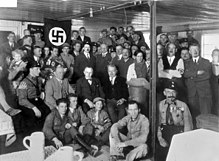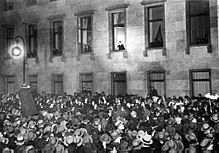Im the smart but dumb type of student in my school
why would you say that so
Rise to power
Main article: Adolf Hitler’s rise to power
Nazi Party election results[137]|Election|Total votes|% votes|Reichstag seats|Notes|
| — | — | — | — | — |
|May 1924|1,918,300|6.5|32|Hitler in prison|
|December 1924|907,300|3.0|14|Hitler released from prison|
|May 1928|810,100|2.6|12||
|September 1930|6,409,600|18.3|107|After the financial crisis|
|July 1932|13,745,000|37.3|230|After Hitler was candidate for presidency|
|November 1932|11,737,000|33.1|196||
|March 1933|17,277,180|43.9|288|Only partially free during Hitler’s term as chancellor of Germany|
Brüning administration
The Great Depression provided a political opportunity for Hitler. Germans were ambivalent about the parliamentary republic, which faced challenges from right- and left-wing extremists. The moderate political parties were increasingly unable to stem the tide of extremism, and the German referendum of 1929 helped to elevate Nazi ideology.[138] The elections of September 1930 resulted in the break-up of a grand coalition and its replacement with a minority cabinet. Its leader, chancellor Heinrich Brüning of the Centre Party, governed through emergency decrees from President Paul von Hindenburg. Governance by decree became the new norm and paved the way for authoritarian forms of government.[139] The Nazi Party rose from obscurity to win 18.3 per cent of the vote and 107 parliamentary seats in the 1930 election, becoming the second-largest party in parliament.[140]
Hitler and Nazi Party treasurer Franz Xaver Schwarz at the dedication of the renovation of the Palais Barlow on Brienner Straße in Munich into the Brown House headquarters, December 1930
Hitler made a prominent appearance at the trial of two Reichswehr officers, Lieutenants Richard Scheringer and Hanns Ludin, in late 1930. Both were charged with membership in the Nazi Party, at that time illegal for Reichswehr personnel.[141] The prosecution argued that the Nazi Party was an extremist party, prompting defence lawyer Hans Frank to call on Hitler to testify.[142] On 25 September 1930, Hitler testified that his party would pursue political power solely through democratic elections,[143] which won him many supporters in the officer corps.[144]
Brüning’s austerity measures brought little economic improvement and were extremely unpopular.[145] Hitler exploited this by targeting his political messages specifically at people who had been affected by the inflation of the 1920s and the Depression, such as farmers, war veterans, and the middle class.[146]
Although Hitler had terminated his Austrian citizenship in 1925, he did not acquire German citizenship for almost seven years. This meant that he was stateless, legally unable to run for public office, and still faced the risk of deportation.[147] On 25 February 1932, the interior minister of Brunswick, Dietrich Klagges, who was a member of the Nazi Party, appointed Hitler as administrator for the state’s delegation to the Reichsrat in Berlin, making Hitler a citizen of Brunswick,[148] and thus of Germany.[149]
Hitler ran against Hindenburg in the 1932 presidential elections. A speech to the Industry Club in Düsseldorf on 27 January 1932 won him support from many of Germany’s most powerful industrialists.[150] Hindenburg had support from various nationalist, monarchist, Catholic, and republican parties, and some Social Democrats. Hitler used the campaign slogan “Hitler über Deutschland” (“Hitler over Germany”), a reference to his political ambitions and his campaigning by aircraft.[151] He was one of the first politicians to use aircraft travel for campaigning and used it effectively.[152][153] Hitler came in second in both rounds of the election, garnering more than 35 per cent of the vote in the final election. Although he lost to Hindenburg, this election established Hitler as a strong force in German politics.[154]
Appointment as chancellor
Hitler, at a window of the Reich Chancellery, receives an ovation on the evening of his inauguration as chancellor, 30 January 1933
The absence of an effective government prompted two influential politicians, Franz von Papen and Alfred Hugenberg, along with several other industrialists and businessmen, to write a letter to Hindenburg. The signers urged Hindenburg to appoint Hitler as leader of a government “independent from parliamentary parties”, which could turn into a movement that would “enrapture millions of people”.[155][156]
Hindenburg reluctantly agreed to appoint Hitler as chancellor after two further parliamentary elections—in July and November 1932—had not resulted in the formation of a majority government. Hitler headed a short-lived coalition government formed by the Nazi Party (which had the most seats in the Reichstag) and Hugenberg’s party, the German National People’s Party (DNVP). On 30 January 1933, the new cabinet was sworn in during a brief ceremony in Hindenburg’s office. The Nazi Party gained three posts: Hitler was named chancellor, Wilhelm Frick Minister of the Interior, and Hermann Göring Minister of the Interior for Prussia.[[157]]
Fox Droppings
I don’t get what’s going on.
Pretty much i can be smart and dumb at the same time
Huh?
Interesting answer
im studying how hitler died
Are you too lonely or what
I’m studying World War 1 Background & Causes
No. It seems Arsenic is behaving weird.
They scared of what I know
Yeah Arsenic is behaving weird, why don’t you fix it?
im studying how opl3 can make good music
Ok, I will just tell Arsenic to stop.
Ok Bro
Thank you very much with your 6 characters response



